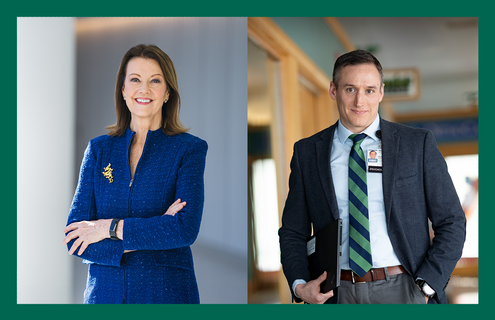
The age of the internet has made connection easier and information more readily available than ever before, but it comes with drawbacks. Social media and the 24-hour news cycle have heightened anxiety and stress in a huge portion of the population. Paired with a seemingly unending stream of historical events in recent years—from the COVID-19 pandemic, to escalating and frequent climate disasters, and even the near-assassination of a major party’s nominee for president on live television less than three weeks ago—have many feeling anxious who didn’t before, and worsened the condition for those who already live with anxiety.
As part of her role as board chair of the American Hospital Association, Dartmouth Health CEO and president Joanne M. Conroy, MD, hosts a monthly Leadership Dialogue video series with leaders across various sectors of healthcare. Conroy was joined this week by Robert E. Brady, PhD, director of Dartmouth Health’s Anxiety Disorders Service. Brady and Conroy discuss the increasing prevalence of anxiety disorders, and why things within our control—as simple as turning off the TV or spending less time on social media—can make a positive difference.
“It’s so constant that you think, ‘It has to be important if they’re putting it on a website this many times,’” Brady said. “But we sometimes fail to remember that the normal stuff of life doesn’t make social media or the news—just the scary stuff. The more you see it, the more you think, ‘This is something I have to be worried about.’”
“This discussion is especially important given our current environment, when events from national news to personal challenges can ratchet up our individual anxiety,” Conroy said. “Dr. Brady shares that more than 30% of Americans have diagnosed anxiety disorders, and almost all of us will suffer from anxiety at some point in our lives. That makes it critically important for our communities, patients, families and workforce to have tools they need to reduce stress and anxiety—to improve both their psychological and physical health.”
About Dartmouth Health
Dartmouth Health, New Hampshire’s only academic health system and the state’s largest private employer, serves patients across northern New England. Dartmouth Health provides access to more than 2,000 providers in almost every area of medicine, delivering care at its flagship hospital, Dartmouth Hitchcock Medical Center (DHMC) in Lebanon, NH, as well as across its wide network of hospitals, clinics and care facilities. DHMC is consistently named the #1 hospital in New Hampshire by U.S. News & World Report, and is recognized for high performance in numerous clinical specialties and procedures. Dartmouth Health includes Dartmouth Cancer Center, one of only 57 National Cancer Institute-designated Comprehensive Cancer Centers in the nation, and the only such center in northern New England; Dartmouth Health Children’s, which includes the state’s only children’s hospital and multiple locations around the region; member hospitals in Lebanon, Keene, Claremont and New London, NH, and Windsor and Bennington, VT; Visiting Nurse and Hospice for Vermont and New Hampshire; and more than 24 clinics that provide ambulatory and specialty services across New Hampshire and Vermont. Through its historical partnership with Dartmouth and the Geisel School of Medicine, Dartmouth Health trains nearly 400 medical residents and fellows annually, and performs cutting-edge research and clinical trials recognized across the globe with Geisel and the White River Junction VA Medical Center in White River Junction, VT. Dartmouth Health and its more than 13,000 employees are deeply committed to serving the healthcare needs of everyone in our communities, and to providing each of our patients with exceptional, personal care.